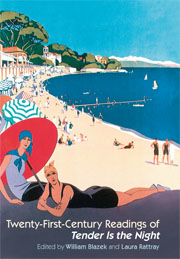Book contents
- Frontmatter
- Contents
- Acknowledgements
- List of Illustrations
- Introduction
- 1 ‘Can't We Put it in Writing?’: Some Short Precursors to Tender Is the Night
- 2 Tender Is the Night, ‘Jazzmania’, and the Ellingson Matricide
- 3 Sanatorium Society: The ‘Good’ Place in Tender Is the Night
- 4 ‘Some Fault in the Plan’: Fitzgerald's Critique of Psychiatry in Tender Is the Night
- 5 An ‘Unblinding of Eyes’: The Narrative Vision of Tender Is the Night
- 6 Si le soleil ne revenait pas: Swiss Clockwork Gone Mad in Tender Is the Night
- 7 ‘A Unity Less Conventional But Not Less Serviceable’: A Narratological History of Tender Is the Night
- 8 American Riviera: Style and Expatriation in Tender Is the Night
- 9 ‘Out Upon the Mongolian Plain’: Fitzgerald's Racial and Ethnic Cross-Identifying in Tender Is the Night
- 10 Gender Anxiety: The Unresolved Dialectic of Fitzgerald's Writing
- 11 Tender Is the Night and the Calculus of Modern War
- 12 Reading Fitzgerald Reading Keats
- Notes on Contributors
- Index
9 - ‘Out Upon the Mongolian Plain’: Fitzgerald's Racial and Ethnic Cross-Identifying in Tender Is the Night
- Frontmatter
- Contents
- Acknowledgements
- List of Illustrations
- Introduction
- 1 ‘Can't We Put it in Writing?’: Some Short Precursors to Tender Is the Night
- 2 Tender Is the Night, ‘Jazzmania’, and the Ellingson Matricide
- 3 Sanatorium Society: The ‘Good’ Place in Tender Is the Night
- 4 ‘Some Fault in the Plan’: Fitzgerald's Critique of Psychiatry in Tender Is the Night
- 5 An ‘Unblinding of Eyes’: The Narrative Vision of Tender Is the Night
- 6 Si le soleil ne revenait pas: Swiss Clockwork Gone Mad in Tender Is the Night
- 7 ‘A Unity Less Conventional But Not Less Serviceable’: A Narratological History of Tender Is the Night
- 8 American Riviera: Style and Expatriation in Tender Is the Night
- 9 ‘Out Upon the Mongolian Plain’: Fitzgerald's Racial and Ethnic Cross-Identifying in Tender Is the Night
- 10 Gender Anxiety: The Unresolved Dialectic of Fitzgerald's Writing
- 11 Tender Is the Night and the Calculus of Modern War
- 12 Reading Fitzgerald Reading Keats
- Notes on Contributors
- Index
Summary
When psychiatrist Dick Diver in Fitzgerald's Tender Is the Night loses wife, vocation, and moral compass, his long decline is punctuated by repeated unstable boundary constructions of race and ethnicity in which Fitzgerald works through racial anxieties in a continuing dialogue on whiteness and darker males. By the end of the novel, Tender's three most prominent American white female characters (Nicole Warren Diver, Rosemary Hoyt, Mary North) are all paired off with ‘darker’ men in Fitzgerald's largely naïve Orientalism, beyond American and northern European identity and the desire and control of all-American Doctor Diver. Dick Diver himself repeatedly desires to desire a figure whom I designate as ‘the girl’ in a chaste sentimentalism that is often framed in his moments of racial and sexual stress. This ‘innocent’ desire is almost pre-pubescent in its articulation and is part of the dynamics of Dick's racialism and anger against foreigners exhibited during his eventual downfall in Books 2 and 3. He has a specific desiring script that is based on black–white difference and is displayed in his relation to Tender's ‘darker’ males, whom he often resents while defining himself against them. Ultimately, in Tender, Fitzgerald was captivated by Hollywood conceptions of darker (white) males while downgrading the conceptualization of African Americans and African Europeans to parodic emblem status, as in the Paris murder and narrative manipulation of the body of Jules Peterson.
- Type
- Chapter
- Information
- Twenty-First Century Readings of 'Tender is the Night' , pp. 160 - 176Publisher: Liverpool University PressPrint publication year: 2007
- 5
- Cited by



